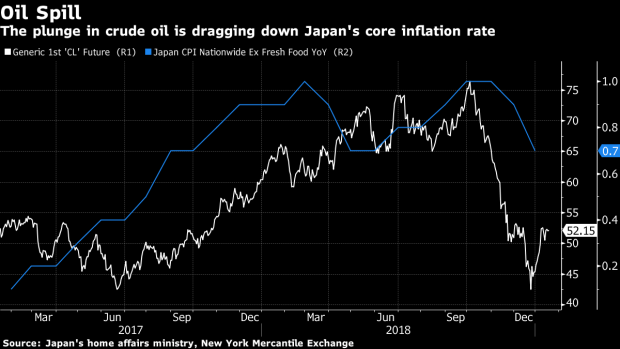Jan 17, 2019
Japan’s Inflation Slows Again as Cheaper Oil Undermines the BOJ
, Bloomberg News

(Bloomberg) -- Japan’s key inflation gauge slowed in the first back-to-back decline since April, highlighting the difficulty of the Bank of Japan’s price goal ahead of its policy meeting next week.
Consumer prices excluding fresh foods rose 0.7 percent from a year earlier in December, according to the ministry of internal affairs Friday. That’s slightly weaker than a median estimate of 0.8 percent.
Key Insights
- After providing most of the inflation gains for much of last year, cheaper oil is now limiting the support for prices from energy.
- The slowdown thanks to oil is likely to prompt the BOJ to to cut its inflation forecast, according to people familiar with the matter.
- An increasing number of economists think the BOJ will stick with its current stimulus this year, even as side effects increase.
- Japanese households remain wary of higher prices and the government is on guard against anything that may reduce household spending ahead of a sales-tax hike scheduled for October.
- Some economists, including former BOJ chief economist Hideo Hayakawa, point out the risk of core inflation diving below zero percent this year far from its 2 percent goal.
Get More
- Overall, consumer prices rose 0.3 percent in December from a year ago, versus expectations for an increase of 0.3 percent.
- Excluding energy and fresh food, inflation rose 0.3 percent. The forecast was for a gain of 0.3 percent.
To contact the reporter on this story: Toru Fujioka in Tokyo at tfujioka1@bloomberg.net
To contact the editors responsible for this story: Brett Miller at bmiller30@bloomberg.net, Paul Jackson
©2019 Bloomberg L.P.


